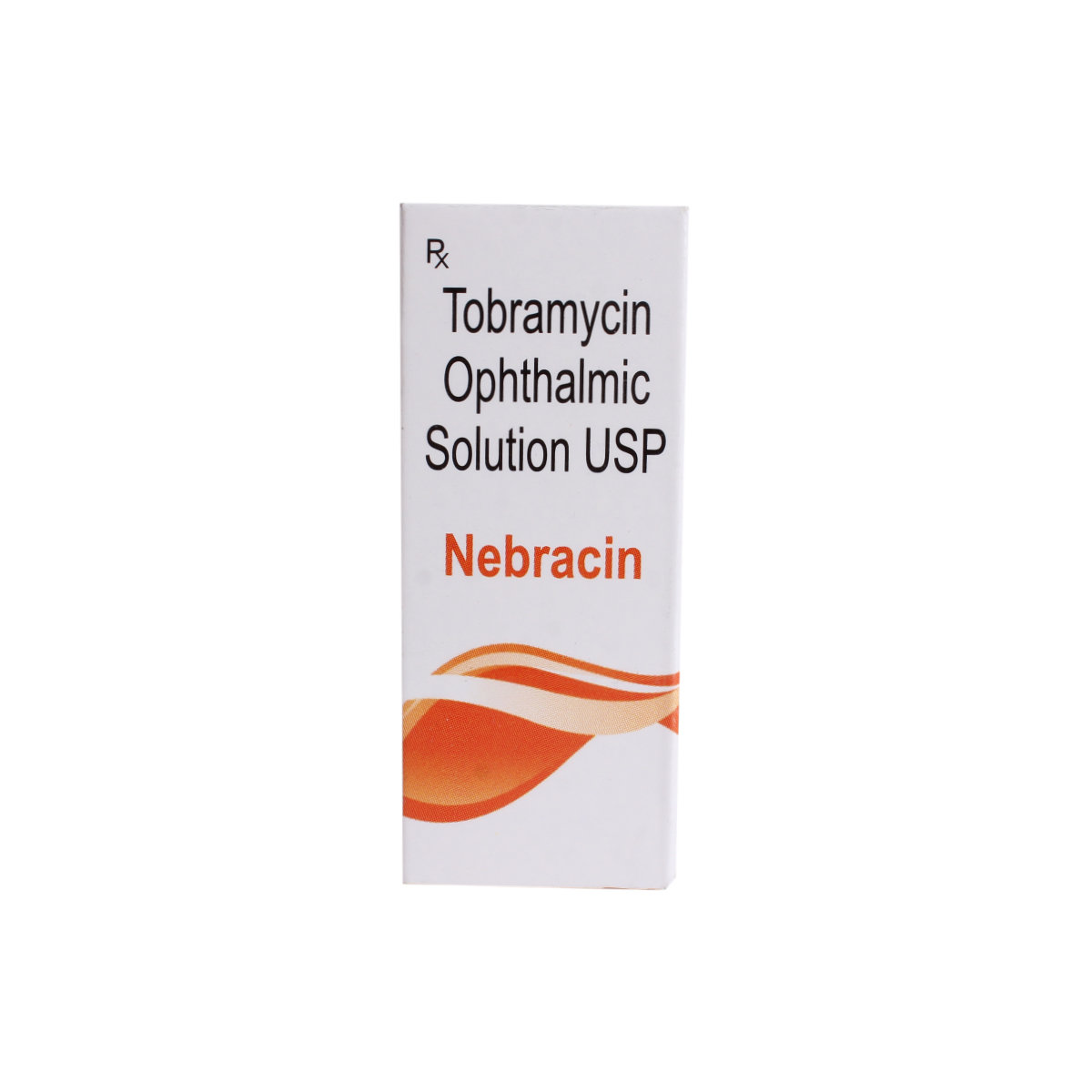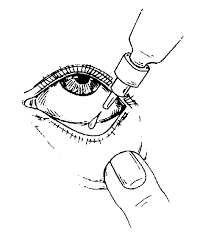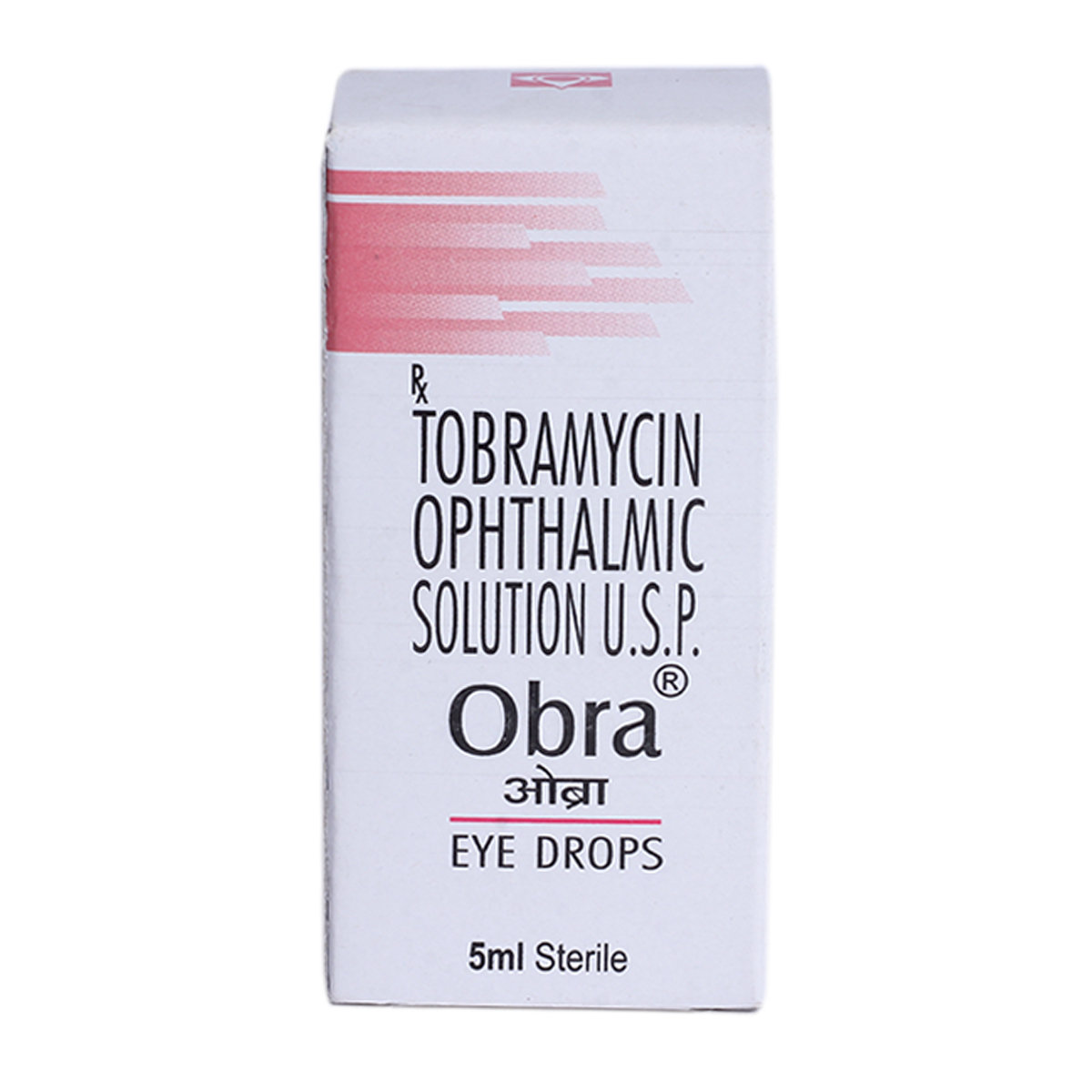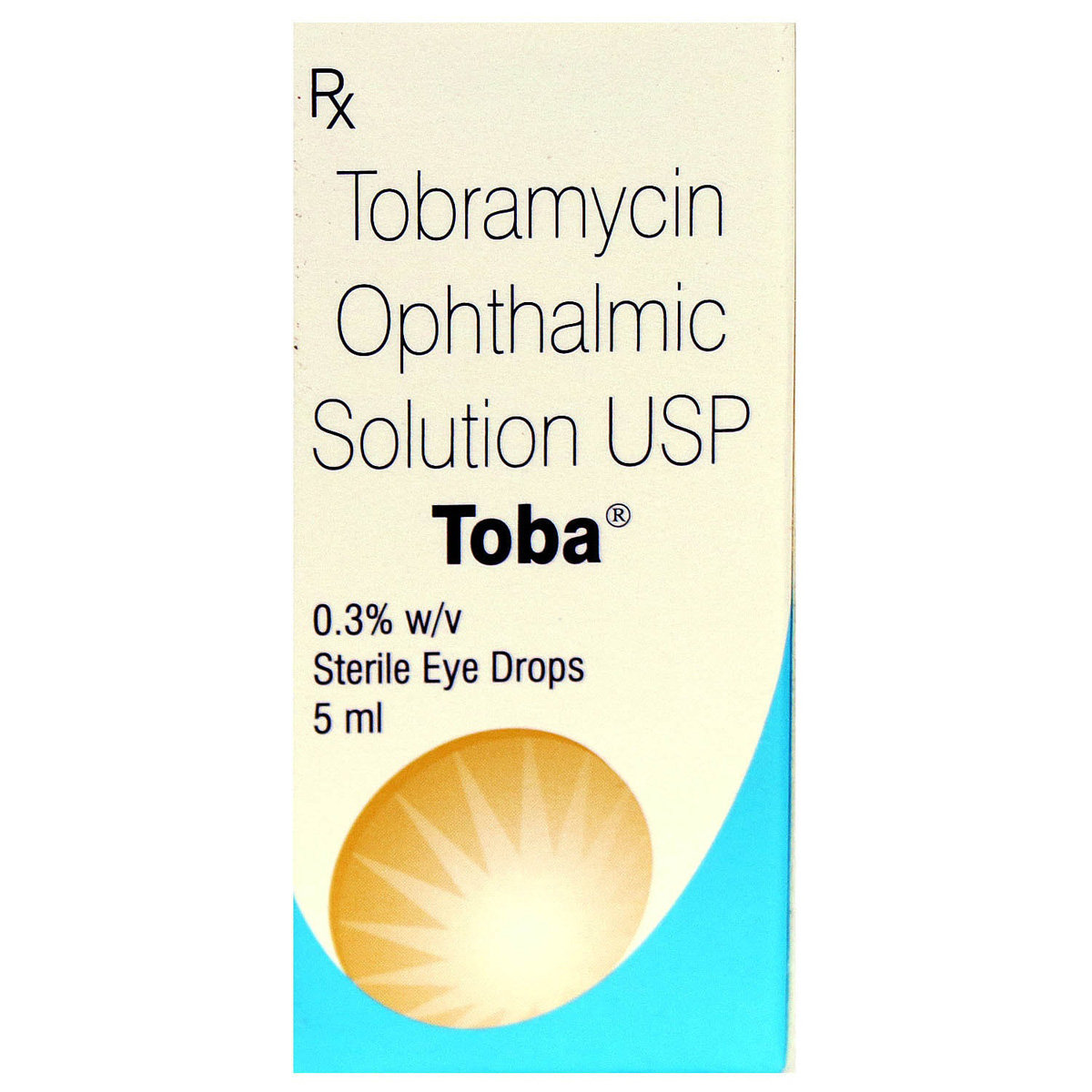Tobracid Eye Drops 5 ml
MRP ₹85
(Inclusive of all Taxes)
₹12.8 Cashback (15%)
Provide Delivery Location
Online payment accepted
 Prescription drug
Prescription drugWhats That
Composition :
Manufacturer/Marketer :
Consume Type :
Expires on or after :
Return Policy :
About Tobracid Eye Drops 5 ml
Tobracid Eye Drops 5 ml is an aminoglycoside antibiotic used to treat bacterial infections. It is mostly used to treat eye infections such as conjunctivitis. Besides this, it is also useful in the treatment of various bacterial infections of the brain and spinal cord (meningitis), stomach or intestines, bladder or kidney (urinary tract infection), lungs (pneumonia), and also used for infections of the bone, skin or soft tissue including burns. A bacterial infection is a condition in which bacteria grows in the body and cause infection. It can target any body part and multiply very quickly. Infectious or harmful bacteria can make you sick and reproduce quickly in your body. These harmful bacteria produce chemicals known as toxins, which can damage tissue and make you sick.
Tobracid Eye Drops 5 ml contains tobramycin. It inhibits bacteria growth by interfering with protein synthesis. It binds to the proteins in the bacteria, disrupting the cell membrane, and eventually leading to cell death. It is active against various gram-negative bacteria and gram-positive bacteria (Staphylococcus aureus). It will not work for other types of infections such as viral, fungal, or parasitic infections.
It is available in the form of drops, ointment, injection, and inhalation. Tobracid Eye Drops 5 ml can cause some common side-effects (when eye drops are used) including redness, itching, swelling, burning sensation, tearing, and temporary blurred vision (with ointment use). Long term use of eye drops may cause a fungal eye infection. So, take this medicine for a duration prescribed by your doctor. When given as an injection, you may experience fever, rash, pain at the injection site, confusion, headache, and diarrhoea. Some patients may also experience serious side-effects such as hearing problems, muscle twitching, and convulsions that may require medical attention.
Inform your doctor if you are allergic to Tobracid Eye Drops 5 ml, other aminoglycoside antibiotics, or any other ingredients present in it. Inform your doctor if you are using other antibiotics, antifungal medication, antiviral drugs, diuretics, general anaesthetics, anti-cancer medicine, immune suppressant, and medications used to treat muscle weakness. Tell your doctor if you have myasthenia gravis (muscle disorders), Parkinson’s disease (a brain disorder), and kidney problems. Inform your doctor if you have any vision problems after using this medication. Tell your doctor if you are pregnant or breastfeeding.
Uses of Tobracid Eye Drops 5 ml
Directions for Use
Key Benefits
Tobracid Eye Drops 5 ml belongs to a class of drugs called aminoglycoside antibiotics. It works by stopping the growth of bacteria. It reduces the infection by inhibiting bacterial growth. It irreversibly binds to a site on the bacterial ribosomes (ribosomes are responsible for protein synthesis), inhibiting protein formation. Proteins are essential for bacterial growth. So, if bacteria cannot make proteins, it will eventually die.
Drug Warnings
Inform your doctor if you are allergic to Tobracid Eye Drops 5 ml, other aminoglycoside antibiotics, or any other ingredients present in it. Inform your doctor if you are using any prescription, nonprescription medications, nutritional supplements, or herbal products. Inform your doctor if you are using other antibiotics, antifungal medication, diuretics, general anaesthetics, chemotherapeutic agents, immune suppressants, and medications used to treat muscle weakness. Inform your doctor if you have any history of myasthenia gravis, Parkinson’s diseases, kidney problems, and eye problems. Inform your doctor if you have any vision problems after using this medication. Do not drive or operate heavy machinery until your vision stabilizes. Tell your doctor if you are pregnant or breastfeeding.
Drug-Drug Interactions
Drug-Drug Interactions
Login/Sign Up
Coadministration of cidofovir with Tobracid Eye Drops 5 ml can cause kidney problems.
How to manage the interaction:
Taking Tobracid Eye Drops 5 ml with Cidofovir is not recommended, but can be taken if prescribed by a doctor. However, if you experience nausea, vomiting, loss of appetite, increased or decreased urination, sudden weight gain or weight loss, swelling, shortness of breath, bone pain, muscle cramps, tiredness, weakness, dizziness, confusion, and irregular heart rhythm contact your doctor immediately. Do not stop using any medications without consulting a doctor.
Co-administration of Tobracid Eye Drops 5 ml with torasemide increases the risk of toxicity.
How to manage the interaction:
Although taking Tobracid Eye Drops 5 ml and torasemide together can possibly result in an interaction, it can be taken if your doctor has advised it. However, if you experience symptoms such as blurred vision, dry mouth, dry skin, frequent urination, nausea, and stomach pain, consult a doctor immediately. Do not discontinue any medications without consulting a doctor.
Coadministration of Tobracid Eye Drops 5 ml with Sirolimus can cause an increased risk or severity of kidney problems.
How to manage the interaction:
Although taking Sirolimus and Tobracid Eye Drops 5 ml together can evidently cause an interaction, it can be taken if a doctor has suggested it. However, if you experience nausea, vomiting, a decrease in hunger, increased or decreased urine, weight gain or loss that occurs suddenly, fluid retention, swelling, difficulty breathing, muscle pain, fatigue, weakness, dizziness, confusion, and irregular heartbeat, consult a doctor. Do not discontinue any medications without a doctor's advice.
Taking magnesium sulfate with Tobracid Eye Drops 5 ml can increase the risk of muscle weakness.
How to manage the interaction:
Although taking Magnesium sulfate and Tobracid Eye Drops 5 ml together can evidently cause an interaction, it can be taken if your doctor has suggested it. However, if you experience symptoms such as muscle weakness and breathing difficulties consult your doctor immediately. Do not stop using any medications without a doctor's advice.
Using Atracurium with Tobracid Eye Drops 5 ml can increase the risk of respiratory depression (breathing disorder).
How to manage the interaction:
Although there is a interaction between Tobracid Eye Drops 5 ml and Atracurium, but it can be taken if prescribed by a doctor. Do not stop using any medications without talking to your doctor.
Taking deferasirox with Tobracid Eye Drops 5 ml may increase the risk of kidney problems.
How to manage the interaction:
Taking Tobracid Eye Drops 5 ml with Deferasirox together can possibly result in an interaction, but it can be taken if your doctor has advised it. However, if you experience nausea, vomiting, loss of appetite, increased or decreased urination, sudden weight gain or weight loss, swelling, shortness of breath, bone pain, muscle cramps, tiredness, weakness, dizziness, confusion, and irregular heart rhythm contact your doctor immediately. Do not stop using any medications without talking to your doctor.
Using Botulinum toxin and Tobracid Eye Drops 5 ml together may increase the risk of side effects.
How to manage the interaction:
Although taking Botulinum toxin and Tobracid Eye Drops 5 ml can cause an interaction, it can be taken if prescribed by a doctor. However, contact a doctor immediately if you experience excessive muscle weakness or trouble breathing, swallowing, or speaking. Do not discontinue any medications without consulting a doctor.
Using Vecuronium with Tobracid Eye Drops 5 ml can increase the risk of respiratory depression(hypoventilation).
How to manage the interaction:
Co-administration of Tobracid Eye Drops 5 ml with Vecuronium can possibly result in an interaction, but it can be taken if your doctor has advised it. However, if you experience any unusual symptoms contact your doctor immediately. Do not discontinue any medications without consulting your doctor.
Using Tobracid Eye Drops 5 ml together with everolimus can increase the risk of kidney problems.
How to manage the interaction:
Although there is a possible interaction between Everolimus and Tobracid Eye Drops 5 ml, you can take these medicines together if prescribed by a doctor. However, if you experience sudden weight gain, feeling out of breath, or having kidney problems. If you experience nausea, vomiting, loss of appetite, weight loss, swelling, muscle cramps, weakness, dizziness, confusion, or an irregular heartbeat contact a doctor immediately. Do not stop using any medications without a doctor's advice.
Takin human immunoglobulin with Tobracid Eye Drops 5 ml may raise the risk of kidney problems.
How to manage the interaction:
Although taking Human immunoglobulin and Tobracid Eye Drops 5 ml together can cause an interaction, it can be taken if a doctor has suggested it. However, if you experience nausea, vomiting, loss of appetite, increased or decreased urination, sudden weight gain or loss, swelling, shortness of breath, muscle cramps, tiredness, weakness, dizziness, confusion, or an irregular heart rhythm, consult a doctor. Do not discontinue any medications without consulting a doctor.
Drug-Food Interactions
Drug-Food Interactions
Login/Sign Up
Diet & Lifestyle Advise
- Sleep for at least six to eight hours to rejuvenate your eyes in a natural way.
- Wash your eyes with clean water at least two to three times a day
- Manage stress, eat healthily, drink plenty of water, exercise regularly, and get plenty of sleep.
- Keep your ear clean and dry.
Side Effects of Tobracid Eye Drops 5 ml
Tobracid Eye Drops 5 ml may show side-effects such as redness, itching, tearing, or swelling in the eye after the application of eye drops. These side-effects usually go away after a short time. With the injection, you may experience side-effects such as fever, rash, pain at the injection site, itching, fatigue, drowsiness, weakness, headache, confusion, and diarrhoea. Other side-effects of Tobracid Eye Drops 5 ml are hearing problems, dizziness, ringing in the ears, convulsions, and muscle twitching. These side-effects are serious, and you may require medical attention right away.
Habit Forming
Therapeutic Class
All Substitutes & Brand Comparisons
RX
Out of StockObivin 0.3% Eye Drop
₹26
(₹2.34/ 1ml)
84% CHEAPERRX
Out of StockAppatoba Eye Drop
Appasamy Ocular Devices Pvt Ltd
₹34.5
(₹6.21/ 1ml)
59% CHEAPERRX
Out of StockAobra 0.3% Eye Drop
₹40
(₹7.2/ 1ml)
52% CHEAPER
Drug-Diseases Interactions
Drug-Diseases Interactions
Login/Sign Up
FAQs
Drug-Drug Interactions Checker List
- VANCOMYCIN
- KANAMYCIN
- GENTAMICIN
- STREPTOMYCIN
- FUROSEMIDE
- NEOSTIGMINE
- PYRIDOSTIGMINE
- CYCLOSPORINE
- AMPHOTERICIN B
- CISPLATIN
- CEPHALOTHIN
- ETHACRYNIC ACID
Special Advise
Tobracid Eye Drops 5 ml may alter liver and kidney function, and blood cells count. So, laboratory tests may be performed to monitor these levels. Your doctor may also check for vision and hearing problems.
Disease/Condition Glossary
Conjunctivitis: Conjunctivitis is an eye condition caused by infection or allergies.
Meningitis: Meningitis is an infection of the protective membranes that surround the brain and spinal cord (meninges).
Pneumonia: Pneumonia is swelling (inflammation) of the tissue in one or both lungs. It's usually caused by a bacterial infection. It can also be caused by a virus, such as a coronavirus (COVID-19).

Have a query?
Alcohol
Safe if prescribed
Tobracid Eye Drops 5 ml may increase the risk of drowsiness if alcohol is taken.
Pregnancy
Consult your doctor
Tobracid Eye Drops 5 ml should be used with caution in pregnant women.
Breast Feeding
Consult your doctor
Tobracid Eye Drops 5 ml should be used with caution in breastfeeding mothers.
Driving
Safe if prescribed
Tobracid Eye Drops 5 ml may cause drowsiness. So, it is recommended to avoid driving or operating heavy machinery after taking this medication.
Liver
Consult your doctor
Tobracid Eye Drops 5 ml is safe to use in patients with liver disease only when prescribed by a doctor.
Kidney
Consult your doctor
Tobracid Eye Drops 5 ml should be used with caution in renal problems. Dose adjustments may be necessary.
Children
Safe if prescribed
Tobracid Eye Drops 5 ml should be used in children when prescribed by a child specialist only.












